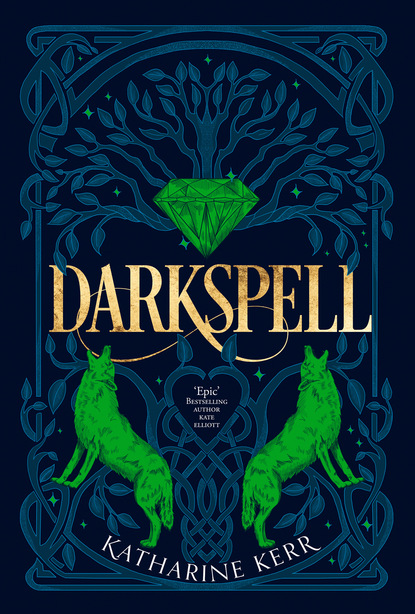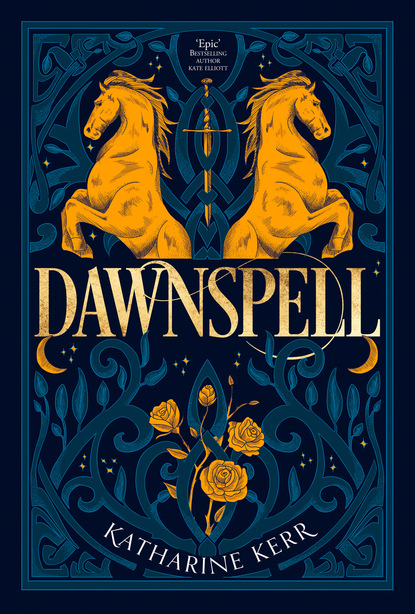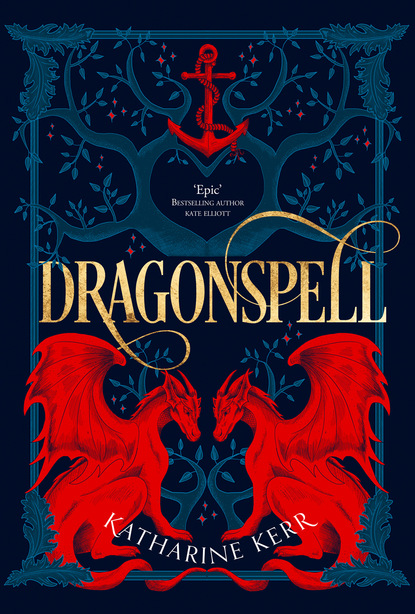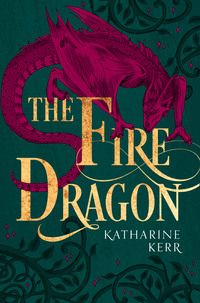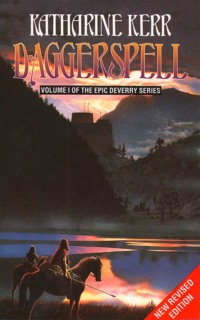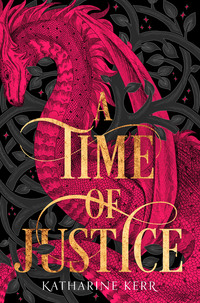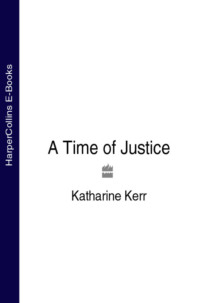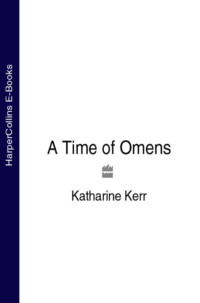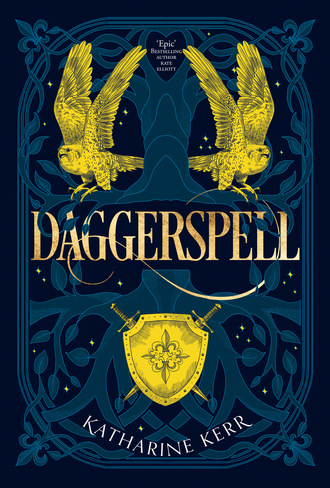
Полная версия
The Deverry Series
“I wish you could talk. If some evil thing should happen to Macyn, could I come live in the woods with your folk?”
The gnome idly scratched his armpit while he considered.
“I mean, you could show me how to find things to eat, and how to keep warm when it snows.”
The gnome nodded in a way that seemed to mean yes, but it was always hard to tell what the Wildfolk meant. Jill didn’t even know who or what they were. Although they suddenly appeared and vanished at will, they felt real enough when you touched them, and they could pick up things and drink the milk that Jill set out for them at night. Thinking of living with them in the woods was as much frightening as it was comforting.
“Well, I hope nothing happens to Macco, but I worry.”
The gnome nodded and patted her arm with a skinny, twisted hand. Since the other children in the village made fun of Jill for being a bastard, the Wildfolk were the only real friends she had.
“Jill?” Macyn was calling her from the tavern yard. “Time to come in and help cook dinner.”
“I’ve got to go. I’ll give you milk tonight.”
They all laughed, dancing in a little circle around her feet, then vanishing without a trace. As Jill walked back, Macyn came to meet her.
“Who were you talking to out here?” he said.
“No one. Just talking.”
“To the Wildfolk, I suppose?”
Jill merely shrugged. She’d learned very early that nobody believed her when she told them that she could see the Wildfolk.
“I’ve got a nice bit of pork for our dinner,” Macyn went on. “We’d best eat quickly, because on a hot night like this, everyone’s going to come for a bit of ale.”
Macyn proved right. As soon as the sun went down, the room filled with local people, men and women both, come to have a good gossip. No one in Bobyr had much real money; Macyn kept track of what everyone owed him on a wooden plank. When there were enough charcoal dots under someone’s mark, Macyn would get food or cloth or shoes from that person and start keeping track all over again. They did earn a few coppers that night from a wandering peddler, who carried round a big pack, holding fancy thread for embroidery, needles, and even some ribands from a town to the west. When Jill served him, she asked, as usual, if he’d ever heard of Cullyn of Cerrmor.
“Heard of him? I just saw him, lass, about a fortnight ago.”
Jill’s heart started pounding.
“Where?”
“Up in Gwingedd. There’s somewhat of a war on, two lords and one of their rotten blood feuds, which is why, I don’t mind telling you, I traveled down this southern way. But I was drinking in a tavern my last night there, and I see this lad with a silver dagger in his belt. That’s Cullyn of Cerrmor, a fellow says to me, and don’t you never cross him, neither.” He shook his head dolefully. “Them silver daggers is all a bad lot.”
“Now here! He’s my da!”
“Oh, is he now? Well, what harsh Wyrd you’ve got for such a little lass—a silver dagger for a da.”
Although Jill felt her face flush hot, she knew that no use lay in arguing. Everyone despised silver daggers. While most warriors lived in the dun of a noble lord and served him as part of his honor-sworn warband, silver daggers traveled round the kingdom and fought for any lord who had the coin to hire them. Sometimes when Da rode to see Jill and her mother, he would have lots of money to give them; at others, barely a copper, all depending on how much he could loot from a battlefield. Although Jill didn’t understand why, she knew that once a man became a silver dagger, no one would ever let him be anything else. Cullyn had never had the chance to marry her mother and take her to live with him in a dun, the way honor-sworn warriors could do with their women.
That night Jill prayed to the Goddess of the Moon to keep her father safe in the Gwingedd war. Almost as an afterthought, she asked the Moon to let the war be over soon, so that Cullyn could come see her right away. Apparently, though, wars were under the jurisdiction of some other god, because it was two months before Jill had the dream. Every now and then, she would dream in a way that was exceptionally vivid and realistic. Those dreams always came true. Just as with the Wildfolk, she had learned early to keep her true dreams to herself. In this particular one, she saw Cullyn come riding into town.
Jill woke in a fever of excitement. Judging from the short shadows that everything had in the dream, Da would arrive round noon. All morning Jill worked as hard as she could to make the time pass faster. Finally, she ran to the front door of the tavern and stood there looking out. The sun was almost directly overhead when she saw Cullyn, leading a big chestnut warhorse up the narrow street. All at once Jill remembered that he didn’t know about Mama. She dodged back inside fast.
“Macco! Da’s coming! Who’s going to tell him?”
“Oh, by the hells!” Macyn ran for the door. “Wait here.”
Jill tried to stay inside, but she grew painfully aware that the men sitting at one table were pitying her. Their expressions made her remember the night when Mama died so vividly that she ran out the door. Just down the street Macyn stood talking to her father with a sympathetic hand on his shoulder. Da was staring at the ground, his face set and grim, saying not a word.
Cullyn of Cerrmor stood well over six feet tall, warrior-straight and heavy-shouldered, with blond hair and ice-blue eyes. Down his left cheek ran an old scar, which made him look frightening even when he smiled. His plain linen shirt was filthy from the road, and so were his brigga, the loose woolen trousers that all Deverry men wore. On his heavy belt hung his one splendor—and his shame—the silver dagger in a tattered leather sheath. The silver pommel with its three little knobs gleamed, as if warning people against its owner. When Macyn finished talking, Cullyn laid his hand on his sword hilt. Macyn took the horse’s reins, and they walked up to the tavern.
Jill ran to Cullyn and threw herself into his arms. He picked her up, holding her tightly. He smelled of sweat and horses, the comforting familiar scent of her beloved da.
“My poor little lass!” Cullyn said. “By the hells, what a rotten father you’ve got!”
Jill wept too hard to speak. Cullyn carried her into the tavern and sat down with her in his lap at a table near the door. The men at the far table set down their tankards and looked at him with cold, hard eyes.
“You know what, Da?” Jill sniveled. “The last thing Mama said was your name.”
Cullyn tossed his head back and keened, a long, low howl of mourning. Hovering nearby, Macyn risked patting his shoulder.
“Here, lad,” Macyn said. “Here, now.”
Cullyn kept keening, one long moan after another, even though Macyn kept patting his shoulder and saying “here now” in a helpless voice. The other men walked over, and Jill hated their tight little smiles, as if they were taunting her da for his grief. All at once, Cullyn realized that they were there. He slipped Jill off his lap, and as he stood up, his sword leapt into his hand as if by dweomer.
“And why shouldn’t I mourn her? She was as decent a woman as the Queen herself, no matter what you pack of dogs thought of her. Is there anyone in this stinking village who wants to say otherwise to my face?”
The clot of men faded back, one cautious step at a time.
“None of you are even fit to be killed to pour blood on her grave. Admit it.”
All the men muttered, “We aren’t, truly.” Cullyn took one step forward, the sword glittering in the sunlight from the door.
“Well and good. Go on, scum—get back to your drinking.”
Instead, shoving each other to be the first out the door, the men fled the tavern. Cullyn sheathed the sword with a slap of the metal into leather. Macyn wiped sweat off his face.
“Well, Macco. You and the village can think as low of me as you want, but my Seryan deserved better than a dishonored piss-poor excuse for a man like me.”
“Er, ah, well,” Macyn said.
“And now you’re all I’ve got left of her.” Cullyn turned to Jill. “We’ve got a strange road ahead of us, my sweet, but we’ll manage.”
“What? Da, are you going to take me with you?”
“Cursed right. And today.”
“Now, here,” Macyn broke in. “Hadn’t you best wait and think this over? You’re not yourself right now, and—”
“By all the ice in all the hells!” Cullyn spun around, his hand on his sword hilt. “I’m as much myself as I need to be!”
“Ah, well.” Macyn stepped back. “So you are.”
“Get your clothes, Jill. Well go see your mother’s grave, and then well be on our way. I never want to see this stinking village again.”
Pleased and terrified all at the same time, Jill ran to the chamber and began bundling the few things she owned into a blanket. She could hear Macyn trying to talk to Cullyn and Cullyn snarling right back at him. She risked calling out softly to the Wildfolk. The gray gnome materialized in midair and floated to the straw-strewn floor.
“Da’s taking me away. Do you want to come? If you do, you’d better follow us or get on his horse.”
When the gnome vanished, Jill wondered if she’d ever see him again.
“Jill!” Cullyn yelled. “Stop talking to yourself and get out here!”
Jill grabbed her bundle and ran out of the tavern. Cullyn shoved her things into the bedroll tied behind his saddle, then lifted her up on top of it. When he mounted, Jill slipped her arms around his waist and rested her face against his broad back. His shirt was stained all over in a pattern of blurry rings, rust marks made by his sweating inside his chain mail. His shirts always looked like that.
“Well,” Macyn said. “Farewell, Jill.”
“Farewell.” All at once she wanted to cry. “And my thanks for being so good to me.”
Macyn waved, somewhat teary-eyed. Jill turned on her uneasy perch to wave back as the horse started off.
On the downhill side of the village stood the holy oaks, sacred to Bel, god of the sun and the king of all the gods. Scattered among them were the village burials. Although Seryan had no stone to mark her grave as the richer people did, Jill knew that she would never forget where it lay. As soon as she led her father there, Cullyn began to keen, throwing himself down full-length on it, as if he were trying to hold his beloved through the earth. Jill trembled until at last he fell silent and sat up.
“I brought your mama a present this trip,” Cullyn said. “And by the gods, she’s going to have it.”
Cullyn pulled his silver dagger and cut out a piece of sod, then dug a shallow hole. He took a bracelet out of his shirt and held it up for Jill to see: a thin rod of bronze, twisted round and round to look like rope. He put it into the hole, smoothed the dirt down, and put the chunk of sod back.
“Farewell, my love,” he whispered. “For all my wandering, I never loved a woman but you, and I pray to every god you believed me when I told you that.” He stood up and wiped the dagger blade clean on the side of his brigga. “That’s all the mourning you’ll ever see me do, Jill, but remember how I loved your mother.”
“I will, Da. Promise.”
All afternoon, they rode down the east-running road, a narrow dirt track through sharp-peaked hills and pine forests. Every now and then they passed fields where the grain stood green and young. The farmers would turn to stare at the strange sight of a warrior with a child behind his saddle. Jill was soon stiff and sore on her uncomfortable perch, but Cullyn rode so wrapped in a dark brooding that she was afraid to speak to him.
Just at twilight, they crossed a shallow river and reached the walled town of Averby. Cullyn dismounted and led the horse along narrow twisting streets while Jill clung to the saddle and looked round wide-eyed. She had never seen so many houses in her life—easily two hundred of them. On the far side they reached a shabby inn with a big stable out in back, where the innkeep greeted Cullyn by name and gave him a friendly slap on the shoulder. Jill was too tired to eat dinner. Cullyn carried her upstairs to a dusty wedge-shaped chamber and made her a bed out of his cloak on a straw mattress. She fell asleep before he’d blown the candle out.
When she woke, the room was full of sunlight, and Cullyn was gone. Jill sat up in a panic, trying to remember why she was in this strange chamber with nothing but a pile of gear. It wasn’t long before Cullyn came back, with a brass bowl of steaming water in one hand and a large chunk of bread in the other.
“Eat this, my sweet,” he said.
Gladly Jill started in on the bread, which was studded with nuts and currants. Cullyn set the bowl down, rummaged in his saddlebags for soap and a fragment of mirror, then knelt on the floor to shave. He always shaved with his silver dagger. As he took it out, Jill could see the device engraved on the blade, a striking falcon, which was Cullyn’s mark, graved or stamped on everything he owned.
“That dagger looks awfully sharp, Da.”
“It is.” Cullyn began lathering his face. “It’s not pure silver, you see, but some sort of alloy. It doesn’t tarnish as easily as real silver, and it holds an edge better than any steel. Only a few silversmiths in the kingdom know the secret, and they won’t tell anyone else.”
“Why not?”
“And how should I know? A suspicious lot, the smiths who serve the silver dagger. I tell you, not just any exile or dishonored man can buy one of these blades. You have to find yourself another silver dagger and ride with him awhile—prove yourself, like—and then he’ll pledge you to the band.”
“Do you have to show him you can fight good?”
“Fight well.” Cullyn began to shave in neat, precise strokes. “That’s somewhat of it, truly, but only a part. Here, silver daggers have an honor of our own. We’re scum, all of us, but we don’t steal or murder. The noble lords know we don’t, and so they trust us enough to give us our hires. If a couple of the wrong kind of lads got into the band, gave us a bad name, like, well, then, we’d all starve.”
“Da, why did you want to be a silver dagger?”
“Don’t talk with your mouth full. I didn’t want to. It was the only choice I had, that’s all. I’ve never heard of a man being so big a fool as to join up just because he wanted to.”
“I don’t understand.”
Cullyn considered, wiping the last bit of lather off his upper lip with the back of his hand.
“Well,” he said at last. “No fighting man joins the daggers if he has a chance at a decent life in a lord’s dun. Sometimes men are fools, and we do things that mean no lord would let us ride in his warband ever again. When that happens, well, carrying the dagger is a fair sight better than sweeping out a stable or suchlike. At least you get to fight for your hire, like a man.”
“You never could have been a fool!”
Cullyn’s lips twitched in a brief smile.
“But I was, truly. A long time ago your old Da here was a rider in a warband in Cerrmor, and he got himself into a good bit of trouble. Never dishonor yourself, Jill. You listen to me. Dishonor sticks closer to you than blood on your hands. So my lord kicked me out, as he had every right to do, and there was nothing left for me but the long road.”
“The what?”
“The long road. That’s what silver daggers call our life.”
“But Da, what did you do?”
Cullyn turned to look at her with eyes so cold that Jill was afraid he was going to slap her.
“When you’re done eating,” he said instead, “we’re going to the market fair and buy you some lad’s clothes. Dresses aren’t any good for riding and camping by the road.”
And Jill realized that she would never have the courage to ask him that question again.
Cullyn was as good as his word about the new clothes. In fact, he bought her so many things, boots, brigga, shirts, a good wool cloak and a small ring brooch to clasp it with, that Jill realized she’d never seen him with so much money before, real coins, all of them bright-minted silver. When she asked him about it, Cullyn told her that he’d captured a great lord’s son on the field of battle, and that this money was the ransom the lord’s family had to pay him to get their son back.
“That was honorable, Da. Not killing him, I mean, and then letting him go home.”
“Honorable? I’ll tell you, my sweet, it’s every silver dagger’s dream to capture a lord single-handedly. It’s the coin you want, not the glory. And by the hells, many a poor lordling has made himself a rich lord doing the same thing.”
Jill was honestly shocked. Taking someone prisoner for profit was one of those things that never got mentioned in the bard songs and the glorious tales of war. She was glad enough of the coin, however, especially when Cullyn bought her a pony, a slender gray that she named Gwindyc after the great hero of ancient times. When they returned to the inn, Cullyn took Jill up to their chamber, made her change her clothes, then unceremoniously cropped off her hair like a lad’s with his silver dagger.
“That long hair’s too messy for the road. May the gods blast me if I spend my time combing it for you like a nursemaid!”
Jill supposed that he was right, but when she looked at herself in his bit of mirror, she felt that she no longer really knew who she was. The feeling persisted when they went down to the tavern room of the inn for the noon meal. She wanted to get up and help Blaer the innkeep serve, not sit there and eat stew with the other customers. Because it was market day, the tavern was crowded with merchants, who all wore checked brigga as a sign of their station. They looked Cullyn over with a shudder for the silver dagger in his belt and gave him as wide a berth as possible. Jill was just finishing her stew when three young riders from a warband swaggered in and demanded ale. Jill knew they were a lord’s riders because their shirts had embroidered blazons, running stags in this case, on the yokes. They stood right in the way near the door and kept Blaer so busy that when Cullyn wanted more ale, he had to get up and fetch it himself. As he was coming back with the full tankard, he passed the three riders. One of them stepped forward and deliberately jogged Cullyn’s arm, making him spill the ale.
“Watch your step,” the rider sneered. “Silver dagger.”
Cullyn set the tankard down and turned to face him. Jill climbed up on the table so she could see. Grinning, the other two riders moved back to the wall.
“Are you looking for a fight?” Cullyn said.
“Just looking to make a lout of a silver dagger mind his manners. What’s your name, scum?”
“Cullyn of Cerrmor. And what’s it to you?”
The room went dead silent as every man in it turned to stare. The other two riders laid urgent hands on their friend’s shoulders.
“Come along, Gruffidd. Just drink your wretched ale. You’re a bit young to die.”
“Get away,” Gruffidd snarled. “Are you calling me a coward?”
“Calling you a fool.” The rider glanced at Cullyn. “Here, our apologies.”
“Don’t you apologize for me,” Gruffidd said. “I don’t give a pig’s fart if he’s the Lord of Hell! Listen, silver dagger, not half of those tales about you can be true.”
“Indeed?” Cullyn laid his hand on his sword hilt.
It seemed that the whole room gasped, even the walls. Jill clasped her hands over her mouth to keep from screaming. Frightened men leapt back.
“Here!” Blaer yelped. “Not in my inn!”
Too late—Gruffidd drew his sword. With a sour smile, Cullyn drew his own, but he let the blade trail lazily in his hand with the point near the floor. The room was so quiet that Jill heard her heart pounding. Gruffidd moved and struck—his sword went flying. Across the room men yelped and dodged as the sword fell clattering to the floor. Cullyn had his blade raised, but casually, as if he were only using it to point out something. There was a smear of blood on it. Cursing under his breath, Gruffidd clutched his right wrist with his left hand. Blood welled between his fingers.
“I call you all to witness that he struck first,” Cullyn said.
The room broke into excited whispers as Gruffidd’s friends dragged him away. Blaer hurried after them, quite pale and carrying the rider’s sword. Cullyn wiped the blood off his blade on his brigga leg, sheathed it, then picked up his tankard and came back to the table.
“Jill, get down!” he snapped. “Where’s your courtesy?”
“I just wanted to see, Da. That was splendid. I never even saw you move.”
“Neither did he. Well, Jill, I’m going to drink this ale, and then we’ll be packing up and getting on the road.”
“I thought we were going to stay here tonight.”
“We were.”
All aflutter, Blaer ran over.
“By the pink asses of the gods! How often does this sort of thing happen to you?”
“Far too often. These young dogs would count it an honor to be the man who killed Cullyn of Cerrmor.” Cullyn took a long swallow of ale. “So far all they’ve won for their trouble is a broken wrist, but ye gods, it wearies me.”
“So it must.” Blaer shuddered as if he were cold. “Well, lass, it’s a strange life you’re going to lead, riding with him. You’ll make some man a cursed strange wife someday, too.”
“I’ll never marry a man who isn’t as great a swordsman as my Da. So probably I’ll never marry at all.”
That afternoon they rode fast and steadily, finally stopping about an hour before sunset when Cullyn judged that they’d gotten far enough away from Gruffidd’s warband. They found a farmer who let them camp in a corner of his pasture and who sold them oats for Cullyn’s horse and the new pony. While Cullyn scrounged dead wood from the nearby forest for a fire, Jill put the horses on their tether ropes and staked them out. She had to stand on the head of the stakes and use her whole weight, but finally she forced them in. She was starting back to the camp when the gray gnome appeared, popping into reality in front of her and dancing up and down. With a laugh, Jill picked him up in her arms.
“You did follow me! That gladdens my heart.”
The gnome gave her a gape-mouthed grin and put his arms around her neck. He felt dry, a little scaly to the touch, and smelled of freshly turned earth. Without thinking, Jill carried him back to camp and talked all the while about the things that had happened on the road. He listened solemnly, then suddenly twisted in her arms in alarm and pointed. Jill saw Cullyn, trotting back with a load of wood, and his eyes were narrow with exasperation. The gnome vanished.
“Jill, by the gods!” Cullyn snapped. “What cursed strange kind of game or suchlike were you playing? Talking to yourself and pretending to carry something, I mean.”
“It was naught, Da. Just a game.”
Cullyn dumped the wood onto the ground.
“I won’t have it. It makes you look like a half-wit or suchlike, standing around talking to yourself. I’ll buy you a doll if you want something to talk to that badly.”
“I’ve got a doll, my thanks.”
“Then why don’t you talk to it?”
“I will, Da. Promise.”
Cullyn set his hands on his hips and looked her over.
“And just what were you pretending? More of that nonsense about the Wildfolk?”
Jill hung her head and began scrubbing at the grass with the toe of her boot. Cullyn slapped her across the face.
“I don’t want to hear a word of it. No more of this babbling to yourself.”
“I won’t, Da. Promise.” Jill bit her lip hard to keep back the tears.
“Oh, here.” Suddenly Cullyn knelt down in front of her and put his hands on her shoulders. “Forgive me the slap, my sweet. Your poor old father’s all to pieces these days.” He hesitated for a moment, looking honestly troubled. “Jill, listen to me. There’s plenty of people in the kingdom who believe the Wildfolk are real enough. Do you know what else they believe? That anyone who can see them is a witch. Do you know what could happen to you if someone heard you talking to the Wildfolk? For all that you’re but a little lass, there could be trouble over it. I don’t want to have to cut my way through a crowd of farmers to keep you from being beaten to death.”


